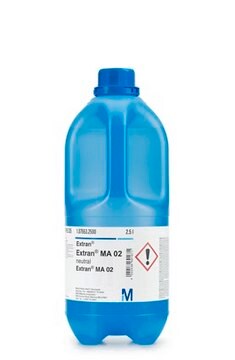1.37002
Citric acid
anhydrous powder, EMPROVE® EXPERT, Ph. Eur., BP, ChP, JP, USP
Pharma Manufacturing
Synonym(s):
2-Hydroxypropane-1,2,3-tricarboxylic acid, Hydroxytricarballylic acid
About This Item
Recommended Products
Agency
BP
ChP
JP
Ph. Eur.
USP
Quality Level
vapor pressure
<0.1 hPa ( 20 °C)
product line
EMPROVE® EXPERT
Assay
99.5-100.5% substance (anhydrous) basis (alkalimetric)
form
fine powder
solid
feature
RNase and DNase free
expl. lim.
8 %, 65 °F
technique(s)
API processing | cocrystal formation: suitable
API processing | salt formation: suitable
pH
1.7 (20 °C, 100 g/L in H2O)
pKa
(1) 3.13, (2) 4.76, (3) 6.4
bp
200 °C/1013 hPa (decomposition)
mp
153-159 °C (lit.)
solubility
water: 1330 g/L at 20 °C
density
1.665 g/cm3 at 18 °C
cation traces
Al: ≤0.2 ppm
Fe: ≤3 ppm
Pb: ≤2 ppm
heavy metals (as Pb): ≤10 ppm
application(s)
liquid formulation
pharma/biopharma processes
pharmaceutical
storage temp.
15-25°C
SMILES string
OC(=O)CC(O)(CC(O)=O)C(O)=O
InChI
1S/C6H8O7/c7-3(8)1-6(13,5(11)12)2-4(9)10/h13H,1-2H2,(H,7,8)(H,9,10)(H,11,12)
InChI key
KRKNYBCHXYNGOX-UHFFFAOYSA-N
Looking for similar products? Visit Product Comparison Guide
General description
As part of our Emprove® Program, our raw materials are offered with extensive documentation facilitating compliance of your pharma and biopharma product, full supply chain transparency and risk mitigation. Our SAFC® portfolio of high-quality products for biopharmaceutical and pharmaceutical formulation and production withstands strict quality control procedures and is produced according to applicable cGMP guidelines.
Application
Due to its low microbial and endotoxin limits, Citric acid anhydrous Emprove® Expert is especially suitable for high-risk applications.
Legal Information
Signal Word
Warning
Hazard Statements
Precautionary Statements
Hazard Classifications
Eye Irrit. 2 - STOT SE 3
Target Organs
Respiratory system
Storage Class Code
11 - Combustible Solids
WGK
WGK 1
Flash Point(F)
Not applicable
Flash Point(C)
Not applicable
Certificates of Analysis (COA)
Search for Certificates of Analysis (COA) by entering the products Lot/Batch Number. Lot and Batch Numbers can be found on a product’s label following the words ‘Lot’ or ‘Batch’.
Already Own This Product?
Find documentation for the products that you have recently purchased in the Document Library.
Our team of scientists has experience in all areas of research including Life Science, Material Science, Chemical Synthesis, Chromatography, Analytical and many others.
Contact Technical Service






